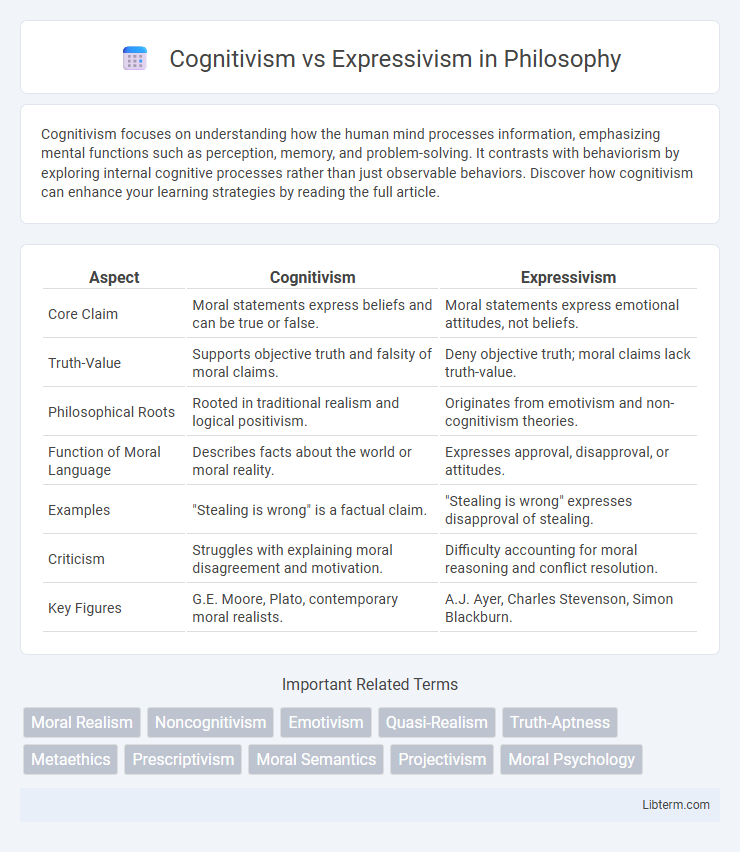Cognitivism focuses on understanding how the human mind processes information, emphasizing mental functions such as perception, memory, and problem-solving. It contrasts with behaviorism by exploring internal cognitive processes rather than just observable behaviors. Discover how cognitivism can enhance your learning strategies by reading the full article.
Table of Comparison
| Aspect | Cognitivism | Expressivism |
|---|---|---|
| Core Claim | Moral statements express beliefs and can be true or false. | Moral statements express emotional attitudes, not beliefs. |
| Truth-Value | Supports objective truth and falsity of moral claims. | Deny objective truth; moral claims lack truth-value. |
| Philosophical Roots | Rooted in traditional realism and logical positivism. | Originates from emotivism and non-cognitivism theories. |
| Function of Moral Language | Describes facts about the world or moral reality. | Expresses approval, disapproval, or attitudes. |
| Examples | "Stealing is wrong" is a factual claim. | "Stealing is wrong" expresses disapproval of stealing. |
| Criticism | Struggles with explaining moral disagreement and motivation. | Difficulty accounting for moral reasoning and conflict resolution. |
| Key Figures | G.E. Moore, Plato, contemporary moral realists. | A.J. Ayer, Charles Stevenson, Simon Blackburn. |
Understanding Cognitivism: Definition and Key Concepts
Cognitivism is a theory in ethics asserting that moral statements express beliefs that can be true or false, emphasizing the role of reason and knowledge in moral judgment. Key concepts include moral realism, which holds that there are objective moral facts, and the notion that ethical language conveys information subject to truth conditions. Understanding cognitivism involves recognizing its contrast with expressivism, which treats moral statements as expressions of emotion rather than factual claims.
What is Expressivism? Core Principles Explained
Expressivism is a metaethical theory asserting that moral statements primarily express emotional attitudes or prescriptions rather than describe factual states. Core principles include the rejection of objective moral truths and the emphasis on moral language as a tool for expressing approval or disapproval, guiding behavior through social interaction. This contrasts with cognitivism, which holds that moral claims are truth-apt and can be evaluated as true or false based on objective criteria.
Historical Background: Origins of the Debate
The debate between Cognitivism and Expressivism originated in the mid-20th century within metaethics, focusing on the nature of moral language and judgment. Cognitivism asserts that moral statements express beliefs that can be true or false, rooted in logical positivism and early analytic philosophy. Expressivism emerged as a reaction, emphasizing that moral language primarily expresses emotional attitudes rather than objective truths, drawing on developments in emotivism and non-cognitivist theories.
Key Differences Between Cognitivism and Expressivism
Cognitivism posits that moral statements express beliefs that can be true or false, emphasizing truth-apt propositional content based on rational evaluation. Expressivism argues that moral language primarily conveys emotional attitudes or prescriptions rather than factual information, highlighting subjective expression over objective truth. The key difference lies in cognitivism's commitment to moral realism and truth-conditional semantics, whereas expressivism stresses non-cognitive functions such as emotional expression and motivational influence.
Cognitivism in Moral Philosophy
Cognitivism in moral philosophy asserts that moral statements express propositions that can be true or false, grounding ethical discourse in objective truth conditions. It contrasts with Expressivism by treating moral judgments as truth-apt beliefs rather than mere emotional expressions or commands. Prominent cognitivists argue that moral knowledge involves rational evaluation and can be systematically debated using logical frameworks.
Expressivism’s Impact on Ethical Language
Expressivism transforms ethical language by emphasizing the expression of emotional attitudes rather than stating objective facts, thereby shifting the focus from truth-conditional semantics to subjective endorsements. This approach challenges traditional moral realism and encourages an understanding of ethical statements as tools for influencing behavior and social coherence. The impact of expressivism on meta-ethics provides a framework that highlights the performative function of moral discourse in shaping community norms and personal commitments.
Arguments in Favor of Cognitivism
Cognitivism asserts that moral statements express beliefs that can be objectively true or false, grounding ethical discourse in rational evaluation and factual analysis. It argues that moral knowledge is attainable through reason, enabling consistent moral judgments that align with objective standards rather than mere emotional responses. Empirical evidence from moral psychology supports cognitivism by demonstrating cognitive processes involved in ethical decision-making, reinforcing the view that moral language refers to truths rather than expressions.
Criticisms of Cognitivism and Counterarguments
Cognitivism faces criticism for oversimplifying emotions as mere cognitive evaluations, neglecting the embodied and situational aspects emphasized by expressivism. Critics argue it fails to account for the non-propositional and phenomenological qualities of emotional experience. However, proponents counter by highlighting empirical evidence from cognitive neuroscience that links emotional states to specific cognitive processes and neural mechanisms, reinforcing the integral role of cognition in emotional appraisal.
Strengths and Weaknesses of Expressivism
Expressivism excels in capturing the subjective dimension of moral language by emphasizing how individuals express attitudes and emotions rather than stating objective facts. Its strength lies in explaining moral disagreement and motivation, as it accounts for varying emotional states behind moral statements. However, expressivism struggles with the problem of moral truth and faces challenges in explaining the logical consistency of moral discourse, as it denies the existence of objective moral facts.
Contemporary Relevance: The Future of the Cognitivism vs Expressivism Debate
The contemporary relevance of the Cognitivism vs Expressivism debate centers on its impact on moral psychology, artificial intelligence ethics, and metaethical theory development. Cognitivism's assertion that moral statements express beliefs subject to truth conditions informs AI systems' decision-making frameworks, while Expressivism's focus on emotional expression influences models of affective computing and ethical AI training. Ongoing interdisciplinary research integrates these perspectives, shaping future discourse on how moral understanding evolves in digital and social contexts.
Cognitivism Infographic

 libterm.com
libterm.com